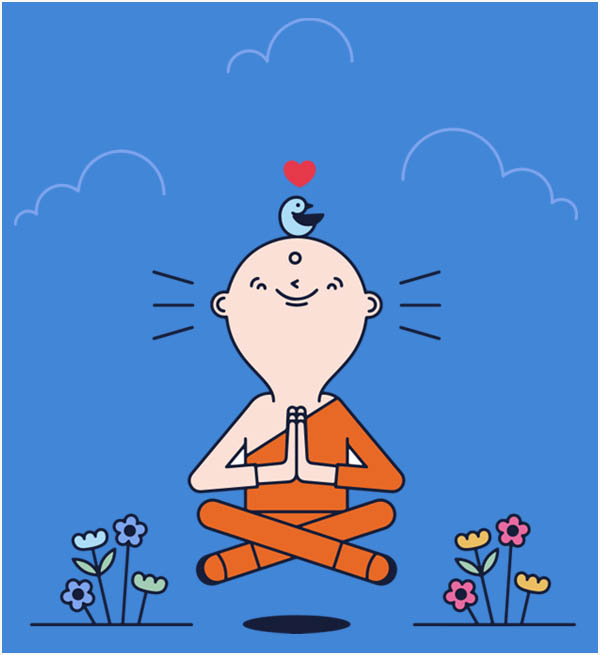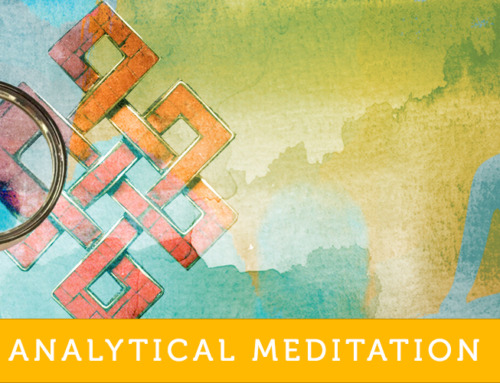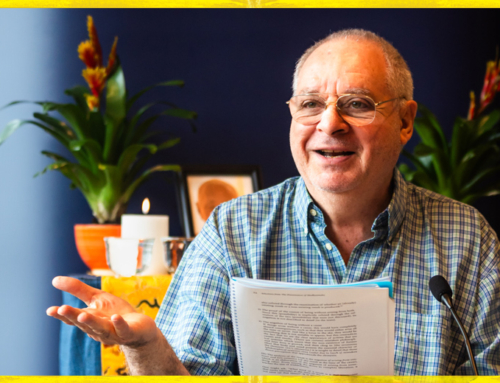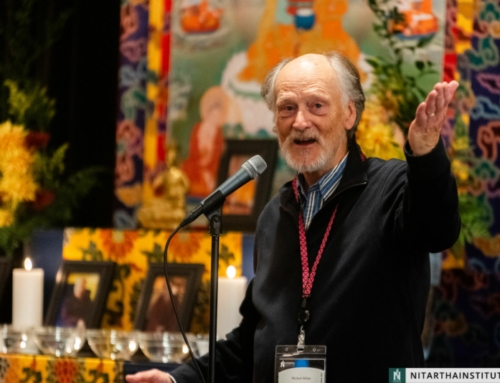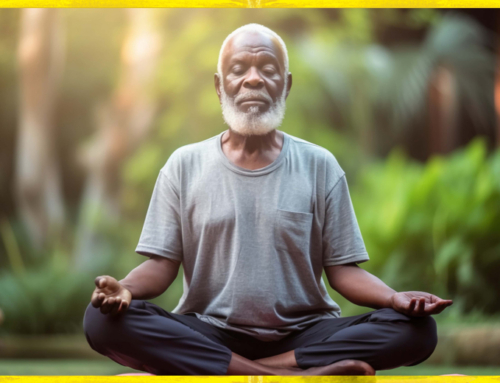This excerpt is copyrighted material, please do not use or copy without written permission from Nitartha Publications.
This excerpt is taken from our ebook that we are giving away this year, Analytical Meditation: Taming the Mind. Please sign up here to receive this detailed, 20-page ebook on analytical meditation by Dzogchen Ponlop Rinpoche.
The Wheel Of Analytical Meditation
Dzogchen Ponlop Rinpoche
In a different text by Lama Mipham, he says that meditation devoid of analysis is like falling asleep and is therefore not beneficial. That is why analysis is taught to be important in our approach to the Buddhist teachings. When we analyze, we do so based on our hearing and contemplating. We do not just select random thoughts to analyze. The method of analysis here is based on the scriptures and reasonings of the dharma teachings. It is not the ordinary sense of analysis, in which our random thoughts go crazy analyzing things. That is okay, but it is not really beneficial here. What is beneficial in meditation is analyzing on the basis of scripture, such as the Buddha’s teaching or the teachings of the great masters Nagarjuna, Asanga, and so on, as well as using logic and reasoning. When we analyze on the basis of scripture and reasoning, it becomes a great support and aid to our meditation. so when we talk about analyzing here, it does not mean letting our thoughts go crazy and analyzing some kind of conspiracy theory. Analysis here is based on scripture and reasoning.
We analyze using scripture and reasoning in this way, and the object of our analysis is the mind. If our analysis goes well, the result is that certainty arises. If certainty arises, then we cut through superimpositions and doubts. When we cut through our superimpositions and doubts, then our meditation can be free of obstacles. If our meditation is not free from superimpositions and doubts, then it is difficult for that meditation to progress. If we try to meditate in the midst of all our superimpositions and doubts, sometimes our meditation itself can become a cause for our mind to be more disturbed. Many people get messed up by meditating. Many people say that their mind was fine before, but since they started meditating things have gotten worse. This happens when our meditation is devoid of certainty. In order to give rise to certainty, we need analysis. Without analysis, we cannot give rise to certainty.
Analytical meditation is really a unique quality of Buddhist teachings. The Buddha always taught that we must analyze. The Buddha always taught that we must question. The Buddha never said that we should accept anything with blind faith. In my view, this is the most profound and distinguishing feature of Buddhism, compared to other traditions, religions, and cultures. The Buddha always said that you must question, and you must come to some kind of certainty. After you have certainty, you can take it or leave it. It’s very American, isn’t it? The Buddha never said, “It’s my way or the highway.” He said that after analysis and once you have certainty, you can embark on the path fully or leave it. It is up to you. If your certainty says it is wrong, then leave it. That’s very liberating, isn’t it? It is different from some supernatural being telling you cannot question or analyze, and that his word is the final word. The Buddha never said anything like that. This is why I think analysis and analytical meditation are so important. This point really strikes the unique feature of the Buddhist teachings and approach.
This is also different from other meditation practices. Other meditation practices tell you what to think, what to focus on, what to recite, what mantras to recite, and things like that. You just do it,t but this one is telling you not to just do it, but to analyze first, and then on the basis of that analysis, you gain certainty. When you gain certainty, you cut through superimpositions and doubts, and when you cut through superimpositions and doubts, the instruction is to rest within that state. So, we do analysis, gain certainty, cut through doubts, and then rest. This is the process of analytical meditation. Isn’t that nice, instead of just meditating like a zombie? Why do you want to be a zombie with someone controlling your brain? From the Buddhist point of view, that is not right. We don’t just do what the gurus say; instead, we analyze and gain certainty, and once we have the certainty, we rest in that. Then a real experience can arise because that certainty is yours. It is not Milarepa’s certainty. It is not Guru Rinpoche’s certainty. It is not Lama Mipham’s certainty. It is your certainty. It is a direct perception and a direct experience. You no longer have to guess what they mean by this or that. You do not have to have endless interviews with lamas, teachers, and practice instructors, because you have gained your own certainty inside of yourself. This is called “unassailable insight.” No one can take it from you. Even if you were thrown in jail, you still would not lose this wisdom. Even if somebody waterboards you, and you are not lucid, it is there as soon as you gain consciousness. They can waterboard you again and again, but as soon as you gain consciousness, your certainty is still present. If your meditation is based on following someone’s instruction, your certainty will not be there when you wake up. Instead you will think, “Oh shucks, where is my meditation? Where is my instruction?” and you will feel very angry at your guru.
From the Buddhist point of view […] we don’t just do what the gurus say; instead, we analyze and gain certainty, and once we have certainty, we rest in that. Then a real experience can arise because that certainty is yours. It is not Milarepa’s certainty. It is not Guru Rinpoche’s certainty. It is not Lama Mipham’s certainty. It is your certainty.
When we give rise to this genuine certainty, it is unassailable by others, it cannot be taken away by others, and it cannot be led in another direction by others. Even if other people tell you that isn’t the way it is or that is not the case, your mind still will not change in regard to your certainty.
In the traditional language of the shedra, it is said that when you give rise to this level of certainty, even if a thousand Buddhas were to show up in front of you and say you have it wrong, you will still not change your mind. Isn’t that nice? Or maybe you have just become extremely stubborn and beyond saving! Therefore, it is important to give rise to genuine certainty. If your certainty is corrupted, you will have a difficult time. This is the essence of why we practice analytical meditation.
In sum, the wheel of analytical meditation purifies the conduct and activity of mind, and we do that by engaging in a detailed personal analysis. This wheel of analytical meditation purifies the conduct and activity of mind by providing us methods to engage in a personal analysis. In other words, we do not rely on others to analyze for us. We could also say that this wheel of meditation engages in a detailed examination and analysis in that it analyzes phenomena as they appear, one by one, or discretely because we must engage in analysis in a continuous and uninterrupted way, it is called a “wheel.”
The way the relationship between analysis and meditation works is that in the beginning, we analyze by using scripture and reasoning. This analysis leads to the development of certainty, when the certainty arises, we rest within that certainty. We arrive at meditation at that point, but we do not just stay in that resting meditation state. We once again pick up our analysis and begin analyzing within resting. So the first stage involves analysis, and the second stage involves practicing analysis and meditation in tandem with each other. In the final stage, we practice resting meditation alone. These three stages carry their own sense of the word “wheel” as well. In the beginning, engaging in analysis in an uninterrupted way is like a wheel. In the middle, engaging in the alternation of resting and analysis in an uninterrupted way has the quality of a wheel, and in the end, allowing the resting meditation to sustain all meditation in an uninterrupted way is also like a wheel.
